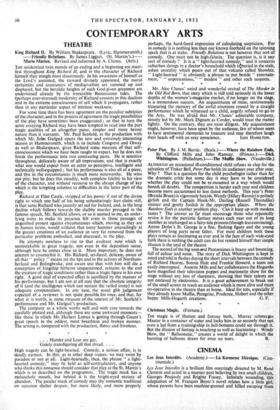CONTEMPORARY ARTS -
THEATRE
TirE unidentical twin moods of an ending and a beginning are mani- fest throughout King Richard II, and in the character of Richard himself they mingle most disastrously. In his awareness of himself as the Lord's anointed, the steward divinely appointed, the moral certainties and assurances of mediaevalism are summed up and displayed, but the heraldic heights of such God-given greatness are undermined already by the irresistible Renaissance tides. The (perhaps over-stressed) modernity of Richard consists in this dualism and in the extreme consciousness of self which it propagates, rather than in any particular aspect of intrinsic weakness.
For some time there has been agreement on the peculiar subtleties of the character, and in the process of agreement the tragic possibilities of the play have sometimes been exaggerated ; so that in turn the actor essaying Richard may have been tempted to read into the part tragic qualities of an altogether purer, simpler and more heroic nature than it warrants. Mr. Paul Scofield, in the production with which Mr. John Gielgud opens the new and extremely interesting season at Hammersmith, which is to include Congreve and Otway as well as Shakespeare, gives Richard some measure of that self- . consciousness which we have been taught to expect, but he does not break the performance into two contrasting parts. He is sensitive 'throughout, delicately aware of all impressions, and that is exactly what one would expect from an actor so perceptive, intelligent and technically well-equipped; but his performance is also all of a piece, and this in the circumstances is much more noteworthy. He wins our pity, but he does this steadily, with complete fidelity to his view of the character, and without recourse to the ablupt change of key which is the tempting solution to difficulties in the latter part of the play. Richard at Flint Castle, stripped of his power if not of the divine right to which one half of his being unhesitatingly lays claim still, is that same Richard who jauntily set sail for Ireland, and, in the long decline which follows towards the shabby murder presaged in the famous speech, Mr. Scofield allows, or so it seemed to me, an under- lying irony to make its presence felt even in those passages of anguished protest against circumstances which, moving as they are in human terms, would without that irony hammer unavailingly at the greater emotions of an audience so very far removed from the particular problems embodied, and discussed, in the play.
He attempts nowhere to rise to that exultant note which is unmistakable in great tragedy, not even in the deposition scene, although here he comes close to it. More important, he does not attempt to counterfeit it. His Richard, set-faced, delicate, aware of all that " policy "means on the lips and in the actions of Northum- berland and Bolingbroke, and aware too that with him will die a conception of kingship hitherto unquestioned, remains to the end the creature of tragic conditions rather than a tragic figure in his own right. A good deal of expected effect is sacrificed by the manner of his performance, but I am not at all sure that the absolute integrity of it (and the intelligence which can sustain the veiled irony) is not adequate compensation. In any case, the usual glib judgement expected of a reviewer is not quite possible for once, and that, for what it is worth, is some measure of the interest of Mr. Scofield 's performance and Mr. Gielgud's production. The company as a whole works well and with care towards the easefully plotted end, although there are some awkward moments— hie those in which Mr. Herbert Lomas is getting through Gaunt's great speech in the oddest, most breathless and broken manner. The setting is, compared with the production, flimsy and frivolous.
• . . . Hamlet and Lear are gay, Gaiety transfiguring all that dread. . . .
High tragedy can be light-hearted. Comedy, a serious affair, is in deadly earnest. In this, as in other deep waters, we may swim 'by paradox or not at all. Light-heartedly, then, the phrase "a light- hearted comedy," may be held as self-confradictory, and anyone who thinks this nonsense should consider that play at the St. Martin's which is so described on the programme. The tragic mask has a • melancholy mouth, but behind it is the bright-eyed ecstasy of abandon. The jocular mask of comedy may (by romantic tradition) on occasion shelter despair, but more likely, and more properly perhaps, the hard-faced expression of calculating scepticism. For in comedy it is nothing less than our known foothold on the spinning speck that is at stake. Friendly Relations is not however that sort of comedy. One must not be high-falutin. The question is, is it any sort of comedy ? It is a" light-hearted comedy," and it concerns suburban doings in a doctor's household Which isiburied in the stale, ashen unreality which pours out of that volcano called Showbiz. " Light-hearted " is obviously a phrase to put beside " entertain- ment; ' " unpretentious," "modest " and other such suspects. * * Mr. Alec Climes' weird and wonderful revival of The Murder in' the Old Red Barn, that story which is still told seriously in the lower depths of the women's-magazine market, if no longer on the stage, is a tremendous success. An acquaintance of mine, sentimentally treasuring the memory of the awful emotions roused by a straight performance which he witnessed as a child, angrily refused to go to the Arts. He was afraid that Mr. Chines' admirable company, stoutly led by Mr. Mark ,Dignam as Corder, would treat the matter lightly. On the contrary, they are most diligent. My acquaintance might, however, have been upset by the audience, few of whom sem to have sentimental memories to treasure and may therefore laugh their heads off with an easy conscience. law HAMILTON.






























 Previous page
Previous page